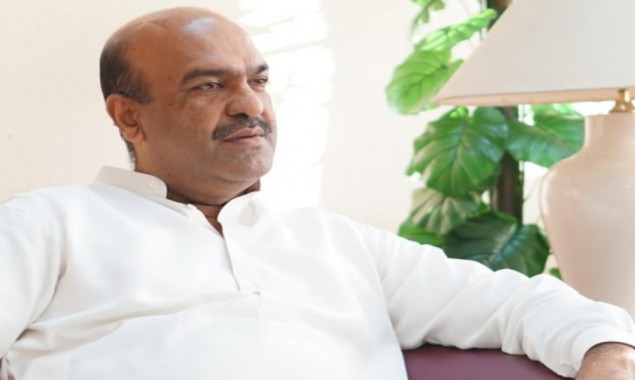
File Phhoto
Q. You left PPP, joined PTI, worked as SAPM and then resigned from the office. Have you left PTI or you are still its member?
Yes, of course. I am a ticket holder of PTI and working as a party representative in my constituency. Taking charge and resignations from office is a routine based task. It doesn’t signify forgoing party membership. I am a part of PTI at the moment.
Q. Since the position of SAPM is a significant one, a lot of people believe that there must have been a rewarding motive behind your resignation. Is that so?
That’s not true. In fact, I wanted to work in my constituency. I didn’t find myself fit for the position I was appointed for, and I think I was unable to contribute in a way that would give me satisfaction. A lot of factors combined due to which I decided to quit and sent my resignation to the honorable PM. It was his benevolence that he chose me for the position of spokesperson and SAPM, even after losing election, and that too without any lobby backing me.
Q. Does that mean you did not have any clash with Imran Khan and other party leaders?
I didn’t have any clash with PM Imran Khan. But I would face opposition from party members while airing my reservations on fixing public issues. For example I had a strong opinion about local body elections, sugar commission, etc. A lot of our friends at senior party positions didn’t support my perspective on issues like wheat and cotton price. The PM always listened to my stance, and often agreed with it. But at the end of the day, it was what the majority decided.
Q. Did you independently chose to leave PPP and join PTI or were you motivated by someone?
Yes, it was my own decision. I had no pressure from any external agency. I am a social worker and want the welfare of people , especially in my constituency. I didn’t have any major clashes with the leadership of PPP either, but there are various underlying issues that made me leave the party I stayed a part of for so long.
Q. Your social media presence shows that you’re fairly popular among people from different political parties, many of whom believe that a person like you must be in the cabinet. What’s your opinion?
I stayed in the cabinet for 3 years. I remained in office throughout that time without receiving any undue favours, and I’ve resigned with dignity too. I’m honored to be loved by people. I’m a people’s person, I love political workers, regardless of their party affiliation, because I believe they are the real essence of democracy. They all have similar problems, similar kinds of hopes and disappointment. A worker doesn’t know what the limitations are for the party leadership, he only trusts them to fulfill the promises made before elections. But after forming the government, there are other complications. New faces appear to take their share.
Q. People who resign are often seen to be under limelight – interacting with the media and public – and sharing their story. You did quite the opposite. Why is that so?
Making an issue out of it or sowing seeds for controversies is not what I wanted. At times we see people being made to leave the office due to their poor performance, or unfair demands. Sometimes people use their resignation to blackmail, defame or pressurize the government. I didn’t have any such issue. I wanted to work for public welfare, but I couldn’t succeed in connecting the political workers with the PM office, so I preferred to accept failure and gracefully quit.
Q. You remained part of the cabinet for 3 years. What are PTI’s most significant contributions towards the welfare of the society?
I’ve witnessed PM Imran Khan take keen interest in solving the issues of the public. He’d be seen heading meetings to address such issues on a daily basis. You don’t often find prime ministers engaging in such activities. Usually, chief ministers or bureaucrats do this job. But PM Imran Khan, identifying the inefficiency of departmental hierarchies, took it upon himself to keep an eye on issues faced by laymen. The PM’s office has never been found to be involved in any financial corruption. On the other hand, the PTI government has been successful in developing the financial sector despite the pandemic. However, I think there are a lot of issues that still haven’t been resolved. I think combating Pakistan Muslim League Nawaz’s (PML-N) stronghold and making its space in the political setup of Pakistan is itself a victory for PTI.
Q. In 2018, when PTI established its government it had announced a different plan while, its actions, so far, did not meet what it had claimed to bring. What are the underlying causes in your opinion?
The bureaucracy and PM’s team could not meet the pace with which PM Imran Khan wanted to work. Whatever promises were made before the elections, PTI didn’t have enough preparation to fulfill those. Local bodies election is one example. I think it’s one thing that can bring about a major change, but on ground, the local bodies system that was used in KPK couldn’t be implemented in Punjab. What was proposed for Punjab lacked political input, hence it couldn’t be materialised. Bureaucracy can’t deliver until there’s adequate political input and assistance from technocrats. Because no system can flourish until there’s public involvement and ownership.
Q. What is the future of Jahangir Tareen in the politics of the country?
His future in politics is bright. During the reign of PML-N the sugar commission followed unfair practices with him. At various instances, he was personally attacked just because he belonged to the PTI. I believe he has been unjustly treated under the sugar commission made in his own party’s rule. It has a lot to do with the organized campaign to tarnish his image.
Q. Jahangir Tareen has been alleged to be in contact with the resented members of the party. Do you have any contact with him?
No, I was never much in touch with him. He belongs to a different class – he’s an industrialist. I can’t have close ties with industrialists, and we have quite a class difference. It’s on record that from the PPP time till now, I’ve been the most vocal – on media as well as on the floor of the house – against the sugar mafia. But I believe that the inquiry should have been across the board. I think another commission should be made to probe into the conduct of this commission. There are a lot of individuals and groups that have remained untouched, and there are those who have been targeted. Though the farmers have got some relief, but the inquiry has not been transparent in a way that the PM wanted. It was unfair towards the government itself.
Q. Nawaz Sharif is in London while PML-N is facing party rifts between Maryam and Shahbaz’s leadership. As a political worker, how do you see PML-N’s future in Pakistan under Nawaz’s leadership?
In my opinion, Nawaz Sharif must come to Pakistan and face the cases. His imprisonment would’ve caused more pressure on the PTI government, and the PML-N would’ve been stronger in that case. I don’t think there is a rift between Shahbaz Sharif and Maryam Nawaz. Their contradicting ideological views are just helping the party secure support from both, anti-establishment and pro-establishment factions of the public.
Q. What do you think about Maryam’s strategy?
If it was about standing her ground on genuine issues or strengthening democracy, it would appear substantial. But I think she’s confused. Speaking up at one time, staying quiet another, it gives the impression of a lack of clarity.
Q. The government wants to introduce voting rights for overseas Pakistanis. What is your take on it?
Overseas Pakistanis should definitely be given voting rights. They have a significant contribution in Pakistan’s development, and each of them is the country’s representative, so they deserve to be involved in the country’s decision making process. But it requires political debate and consensus. Personally, I think overseas Pakistanis must be given due electoral representation through fixed seats according to the population. However, all parties must be taken onboard, so the decision is not reversed when another party comes into power.
Q. In recent years, there have been multiple rumors of dwindling relations between the civil and military leadership of the country. During your tenure as SAPM, what kind of civil-military ties did you witness?
At my time, civil military relations were ideal. There used to be adequate discussions and debates between both the wings over issues of national interest, and I never saw any major conflict. Decisions were taken after input from all stakeholders.
Q. Do you think PM Imran Khan takes decisions under the influence of the military leadership?
As I said earlier, discussions over national issues involve all stakeholders and everyone’s input holds value. So yes, he takes advice and input, but it can’t be called influence. There’s no pressure from any stakeholder on another. It’s a mutual consensus.
Read More News On
Catch all the Pakistan News, Breaking News Event and Latest News Updates on The BOL News
Download The BOL News App to get the Daily News Update & Follow us on Google News.




